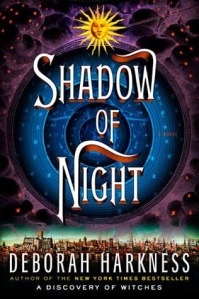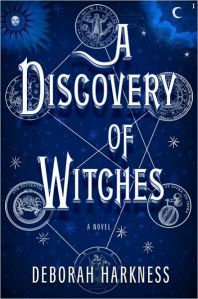Harry Potter for grownups, or realistic fantasy
 Lots of books get described as Harry Potter for grownups. Deborah Harkness' work is the closest I've seen to truly fitting the bill. (Other contenders include Jonathan Strange and Mr. Norrell, which I haven't read yet, and Lev Grossman's Magician books, which I read and liked but consider to be far more Narnia-infused than Potterian, despite the action surrounding teen magicians at a special magical academy.)
When A Discovery of Witches came out, I read it and liked it though I fear I may have read it too fast -- it just felt like the crises were too many and piled on top of each other too quickly.
Lots of books get described as Harry Potter for grownups. Deborah Harkness' work is the closest I've seen to truly fitting the bill. (Other contenders include Jonathan Strange and Mr. Norrell, which I haven't read yet, and Lev Grossman's Magician books, which I read and liked but consider to be far more Narnia-infused than Potterian, despite the action surrounding teen magicians at a special magical academy.)
When A Discovery of Witches came out, I read it and liked it though I fear I may have read it too fast -- it just felt like the crises were too many and piled on top of each other too quickly.
But I knew I was going to read Shadow of Night, the second in a planned trilogy, especially since the protagonists -- witch Diana Bishop and her vampire lover Matthew de Clermont -- were planning to travel back in time to 1590, the Elizabethan era. The book publishes in July but I got my hands on an advance review copy (one of the benefits of being a librarian) and devoured it in just a few days. Then I went back and bought a copy of A Discovery of Witches -- despite the fact that we have two copies in our branch of the library alone. And enjoyed re-reading it thoroughly; my earlier concerns about it just being Too Much seem to have disappeared. Perhaps a couple doses of George R.R. Martin gave me some perspective. Or maybe it really was my own fault for reading it too fast.
If you're vampire-curious, these are far, far better written than the Twilight series or the Sookie Stackhouse novels. If you like some romance in your reading, these have that, too, without many of the conventions and, yes, cliches that define so much romance fiction. If you like old manuscripts and ancient conspiracies, set in academic libraries and old family castles, they've got that -- and I don't even want to mention Dan Brown in the same sentence, these are So. Much. Better.
So why call them Harry Potter for grownups? Because they fit into the same realm of realistic fantasy, a sort of yang to the yin of fantastic realism. While much of what gets labeled fantasy fiction takes place in some alternate universe or a mythical planet, the Harry Potter books, and these, take place in a world we recognize easily as our own -- only it happens to also be occupied by supernatural beings (which we always kind of hoped would be the case, right?). In J.K. Rowling's world, and Harkness', we can easily imagine ourselves living our daily lives, interacting with these witches and wizards and vampires and daemons. In Harkness' books, daemons are creative but often unstable, or as one witch puts it, "rock stars and serial killers." In the second book, Christopher Marlowe is a daemon, and a remarkably unstable one at that. Some people, like Queen Elizabeth, know about the existence of vampires and witches and the witchhunting craze at the time takes on even more sinister cast when there are real witches in danger of persecution simply because of who they are.
She also handles the attractions and dangers of time travel in the most deft way I've read since Connie Willis' Doomsday Book. From speech to clothing to the possibility of screwing up your own future existence -- or, in this case, revealing the fate of a being who thinks he is immortal -- it's all handled with the same straightforward approach. Magical realism has had quite a heyday. With vampires, werewolves and zombies all the rage, I'm ready now for realistic magic and I'd put Harkness at the front of the pack.
